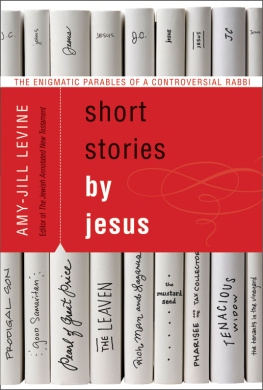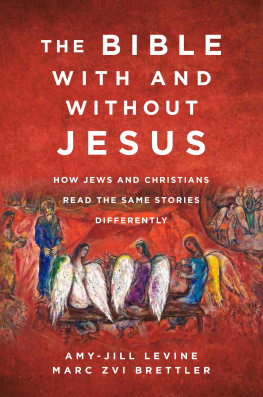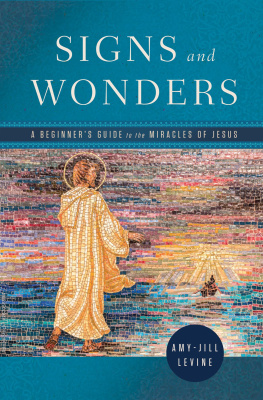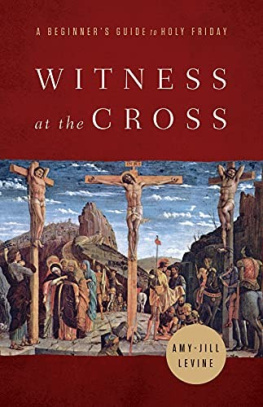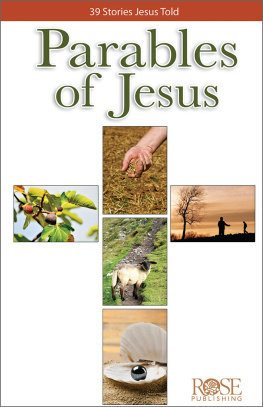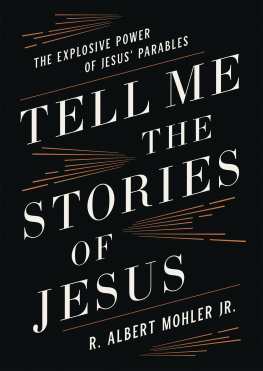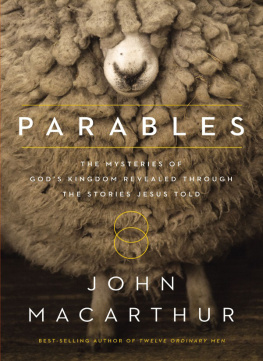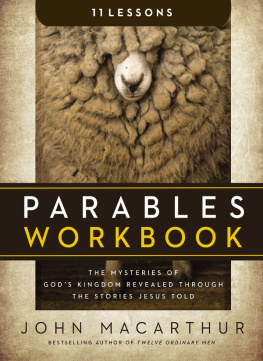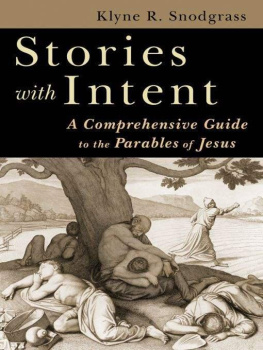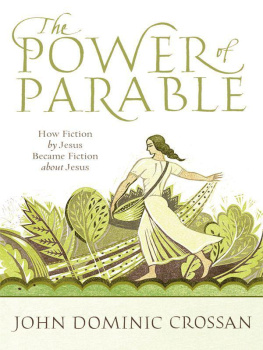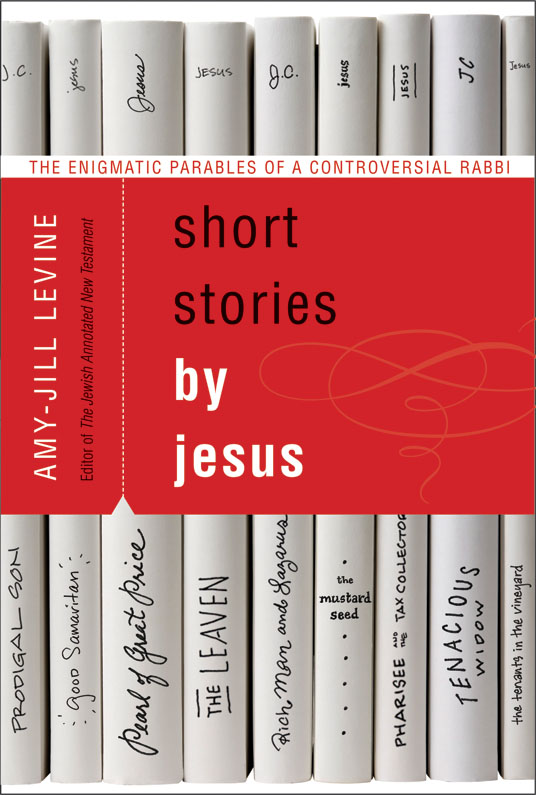For Jay, Sarah Elizabeth, and Alexander David
Contents

P arables, stories some only a sentence or two long, are often seen as the hallmark of Jesuss teaching. As Mark 4.3334 puts it: With many such parables he spoke the word to them, as they were able to hear it; he did not speak to them except in parables, but he explained everything in private to his disciples. Few of these private explanations have been preserved. The crowds then needed to find their own understandings, and we too must find ours.
It is a very good thing that the interpretations, if indeed Jesus did provide them, have not come down to us. The Gospel writers, in their wisdom, left most of the parables as open narratives in order to invite us into engagement with them. Each reader will hear a distinct message and may find that the same parable leaves multiple impressions over time. Different audiences inevitably hear different messages, just as today a listener who is poor or in ill health may form a different interpretation of the Rich Man and Lazarus than a person with a seat on the stock exchange or extended credit from Neiman Marcus. The parable of the Lost Son will convey different nuances to parents than to children, to the irresponsible and indulged (if such children pay attention at all) than to the faithful and overlooked. Reducing parables to a single meaning destroys their aesthetic as well as ethical potential. This surplus of meaning is how poetry and storytelling work, and it is all to the good.
It may also be a good thing that we do not have the explanations that Marks disciples heard and remembered. The Twelve, despite their commission by Jesus, consistently misunderstand him. They do not understand the parable of the Sower, and Jesus despairs of their understanding any of the other parables: And he said to them, Do you not understand this parable? Then how will you understand all the parables? (Mark 4.13). Their lack of understanding shows when Jesus tells them to feed the crowds and they sarcastically respond, Are we to go and buy two hundred denarii worth of bread, and give it to them to eat? (6.37). Following the feeding miracles, Jesus cautions them, Beware of the yeast of the Pharisees and the yeast of Herod (8.15). The disciples then say to one another, It is because we have no bread. Not only have they forgotten that Jesus can cater; they have also missed the implications of Jesuss metaphorical message. No doubt when they heard the parable of the yeast they worried about whether the dough was gluten-free.
Although Peter, Andrew, James, and John are seasoned fishermen, they are afraid of being shipwrecked in a storm, and Jesuswho had been asleep in the boathas to rebuke them for their lack of faith (Mark 4.40). They doubt his awareness of his healing powers (5.31); they dont understand his argument that there is nothing outside a person that by going in can defile, but the things that come out are what defile (7.15); Peter questions his mission, and Jesus responds by calling him Satan, which is not a compliment (8.33); they seek to prevent parents and caregivers from bringing their children to Jesus (10.1316) despite his telling them to welcome children (9.37); Judas betrays him (14.45); Peter, James, and John fall asleep when he is in agony in Gethsemane (14.37); Peter then denies him (14.68); and they all flee from the cross.
Nor, alas, are the named women followers much better when it comes to understanding him. Mary Magdalene, Mary the mother of James, and Salome go to the tomb on Sunday morning to anoint the body (Mark 16.1). Not only do they ask, too late to suggest any advance planning, Who will roll away the stone for us from the entrance to the tomb? (16.3); they are too late with their ointments: at the first supper of Jesuss final week, an unnamed woman had already anointed him (14.8).
Marks disciples are not the best candidates for accurately preserving explanations of parables. Whether they were as clueless as Mark portrays them, or whether the evangelist has deliberately portrayed them as in need of remedial instruction, the literary effect of their descriptions is the same. Mark is telling readers, Go beyond the disciples, be open to the mystery and the challenge, interpret for yourselves. And we readers should be reassured that if Peter, James, and John, even after failing, can find rehabilitation and stay with the program, theres hope for the rest of us.
Granted, we should not be too hard on the disciples. They were looking for something within their comfort zone and, like many, resisted what the parables might convey. Moreover, Jesus was requiring that they do more than listen; he was asking them to think as well. He tells the Twelve, To you has been given the mystery of the kingdom of God, but for those outside, everything comes in parables; in order that they may indeed look, but not perceive, and may indeed listen, but not understand (Mark 4.1112; see also Matt. 13.1113). Mystery is here not indicative of something arcane or in need of a special key to unlock a singular meaning. What makes the parables mysterious, or difficult, is that they challenge us to look into the hidden aspects of our own values, our own lives. They bring to the surface unasked questions, and they reveal the answers we have always known, but refuse to acknowledge. Our reaction to them should be one of resistance rather than acceptance. For our own comfort, we may want to foreclose the meaning rather than allow the parable to open into multiple interpretations. We are probably more comfortable proclaiming a creed than prompting a conversation or pursuing a call.
Religion has been defined as designed to comfort the afflicted and to afflict the comfortable. We do well to think of the parables of Jesus as doing the afflicting. Therefore, if we hear a parable and think, I really like that or, worse, fail to take any challenge, we are not listening well enough.
Such listening is not only a challenge; it is also an art, and this art has become lost. Down through the centuries, starting with the Gospel writers themselves, the parables have been allegorized, moralized, christologized, and otherwise tamed into either platitudes such as God loves us or Be nice or, worse, assurances that all is right with the world as long as we believe in Jesus. Too often we settle for easy interpretations: we should be nice like the good Samaritan; we will be forgiven, as was the prodigal son; we should pray and not lose heart like the importuning widow. When we seek universal morals from a genre that is designed to surprise, challenge, shake up, or indict and look for a single meaning in a form that opens to multiple interpretations, we are necessarily limiting the parables and, so, ourselves.
If we stop with the easy lessons, good though they may be, we lose the way Jesuss first followers would have heard the parables, and we lose the genius of Jesuss teaching. Those followers, like Jesus himself, were Jews, and Jews knew that parables were more than childrens stories or restatements of common knowledge. They knew that parables and the tellers of parables were there to prompt them to see the world in a different way, to challenge, and at times to indict.
We might be better off thinking less about what they mean and more about what they can do: remind, provoke, refine, confront, disturb....
The Parables in Israels Scriptures
The origins of this provocative genre, with its personal, social, and moral barbs, appear in the scriptures of Israel, the books that comprise what the church traditionally calls the Old Testament and the synagogue calls the Tanakh (an acronym for

